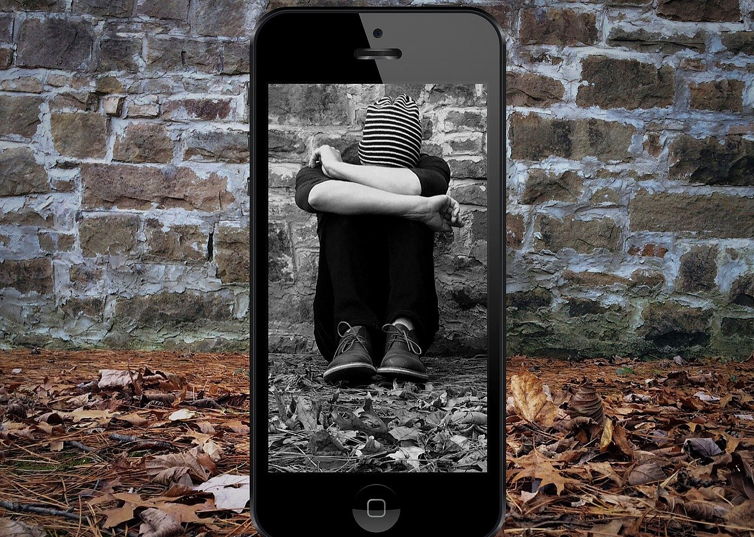
Every day there are more users of social networks such as Instagram, Facebook or Twitter. Through these platforms, we share private information and invest time in knowing about each other. These tools have many positive aspects, as they can help us feel part of a group, reconnect with people from the past or with those who live far from our home, create links with new people, reduce loneliness, feel closer to people from different countries, find role models, share information, etc. But as usual, there are two sides of the same coin and the misuse of these platforms can generate a number of negative psychological consequences that we are not always aware of. Therefore, in this article we will focus on analysing the dark side of social networks.
One of the main errors is to believe everything that we see on social networks. Every day we are bombarded with a large amount of information, photographs and videos of people living an exciting and perfect life. However, we are not aware that behind many of the publications we compare ourselves with, there are a lot of attempts, make-up and filters. Having access to this kind of content is not the problem, but believing it. We must know that not all that glitters is gold, and that people only show what they want you to see. If we fall into that trap, we may think that real life should be like that and we will generate irrational expectations that we will surely not be able to fulfil: I have to weigh so many kilograms to have a perfect body; I have to dress in a certain way to be fashionable; my life must be full of incredible moments all the time, etc. Behind all these expectations lies the general thought “I must achieve all this to be happy and accepted by others”. So what happens when we do not accomplish them? If we constantly compare ourselves with others we will never be satisfied with the kind of life we are living.

On the other hand, due to the incorrect use of the social networks we can end up depending too much on external reinforcement. The positive reaction we get from others in these networks (e.g. likes, visualisations, comments…) provides us with positive reinforcement that can become a necessity and even an addiction for certain people. In these cases, such reinforcement produces a sensation of well-being, but this also fades away very quickly. To experience that feeling again, they must publish new content that receives social attention again, thus creating a vicious circle that makes them constantly dependent on that reinforcement. Moreover, as a consequence of a process called habituation, they become more and more used to this well-being and need more external reinforcement to experience it at the same level. In this way, we can end up turning our appearance in social networks into our main motivation, creating a false happiness totally dependent on external approval. It no longer depends on ourselves, but on others, on the likes and followers we have. This happiness is very fragile and can be broken easily, generating a lot of psychological problems. All this can lead us to neglect our personal identity and fall into the trap of ending up doing what others like or what is fashionable, not what we really want to do. We can get so lost on this way that we can forget who we are.
On the other hand, being too absorbed by what is happening in social networks can lead to a disconnection with the reality around us. Sometimes we spend so much time and pay so much attention to our social networks, that we disconnect from the moment we are living and the people we are with. Surely we have noticed that, increasingly, social meetings are characterized by people who are more aware of the mobile phone than of the conversation that is going on at the moment. Not to mention the time it can take for many people to upload a simple photo or video: multiple attempts, photo editing… All this time invested in having an amazing photo that shows the incredible time that we are having in a dream landscape, prevents us from enjoying that experience. This excessive focus can interfere not only on a social level, but generates problems on an academic and work level, with our performance being diminished by the amount of time we spend on the networks.
Related to this disconnection, the FOMO syndrome (Fear Of Missing Out) has been described. This syndrome is defined as the fear of missing information or important events in social networks and its incidence is increasing among youths.

Another negative consequence of technology in general (especially of social networks) is the overstimulation. It is increasingly difficult for us to spend time without any kind of stimulation and our tolerance for boredom and frustration is being reduced by leaps and bounds. We usually tend to seek easy ways of entertainment (social networks, series or film platforms…) because they are quicker and do not involve any mental effort. Moreover, we live in a world with a frenetic pace of life and, at the end of the day we “deserve a moment of doing nothing”. Resorting to this type of entertainment is not necessarily negative, but it will be when it is our main or only source of distraction. In fact, many people comment that after spending a whole day or afternoon watching Netflix or 2 hours a day checking Instagram, they end up feeling bad. That can be for several reasons. First, we are so used to this kind of overexposure that we often consume this content automatically, without paying attention to what we are really watching (and with the autopilot turned on, we keep thinking about our worries). Secondly, this type of activities does not usually make us feel fulfilled, as we are not making any effort to carry them out.
Finally, another harmful consequence of the misuse of social networks would be virtual harassment, also named Cyberbullying. This type of harassment occurs among peers and is increasingly frequent among youths. The repercussions can be even more damaging than those generated by “traditional” bullying, as it can have a much wider scope and go beyond the school environment. In addition, the fact that the bully may remain anonymous and not directly see the victim can lead to more aggressive psychological harassment, since he or she may feel immune to the consequences and not be aware of the negative impact on the other person.

All the problems discussed so far can originate or increase self-esteem problems, insecurity, isolation, depression, anxiety, distortions of body perception, eating disorders, suicide, etc. The most vulnerable population is usually adolescents, who are immersed in the world of social networks from their earliest years. With their identity still in the process of being formed and with less knowledge about the dangers of these platforms, adolescents are a direct target of the false standards promoted by this type of networks. Despite the fact that adolescents are at higher risk, we must be clear that we all can be victims of those dangers. In recent years, the number of adult users has grown exponentially and although the way of use may differ between adults and adolescents, this does not mean that the formers are exempt from falling into the incorrect use of these tools. All these problems can endanger our physical and emotional integrity. Does this mean that we should stop using social networks or should we forbid our children to do so? Nothing could be further from the truth. These tools are part of our lives and the most rational thing, for those who want to benefit from them, is to learn how to use them responsibly with others and with ourselves. To face the possible consequences of this dark side of social networks, we must first be aware that they exist and that they occur more often than we think. After doing this awareness raising exercise, here are a number of recommendations that can help us prevent these negative consequences:
- Do not let yourself be misled by appearances and consider if what you are seeing is true. A world where only positive emotions exist is not real.
- Generate expectations adjusted to reality: you do not need to have a specific weight to be happy, only to feel healthy and accept yourself; having days when nothing relevant happens is normal, in fact it is mentally healthy.
- If at some point you want to share aspects of your life in networks, do it because you feel like it, not because you need the external approval. And be aware that you may receive comments that you do not like, but that you will be able to assimilate them.
- Try to focus on the present, on the people you meet, on the activity you are doing, on the place you are visiting. Live your life for yourself, do not live it just to show it to others.
- Be aware about the negative consequences that your actions in the networks can have. Behind every screen, there is a person with feelings, just like you.
- Try to transmit these values to the youths around you. Bear in mind that for them, who were practically born with the social networks, it is even more difficult to be aware of their dangers. Teach them how to make a correct use of them and according to their age.
Aina Fiol Veny (B-02615)





